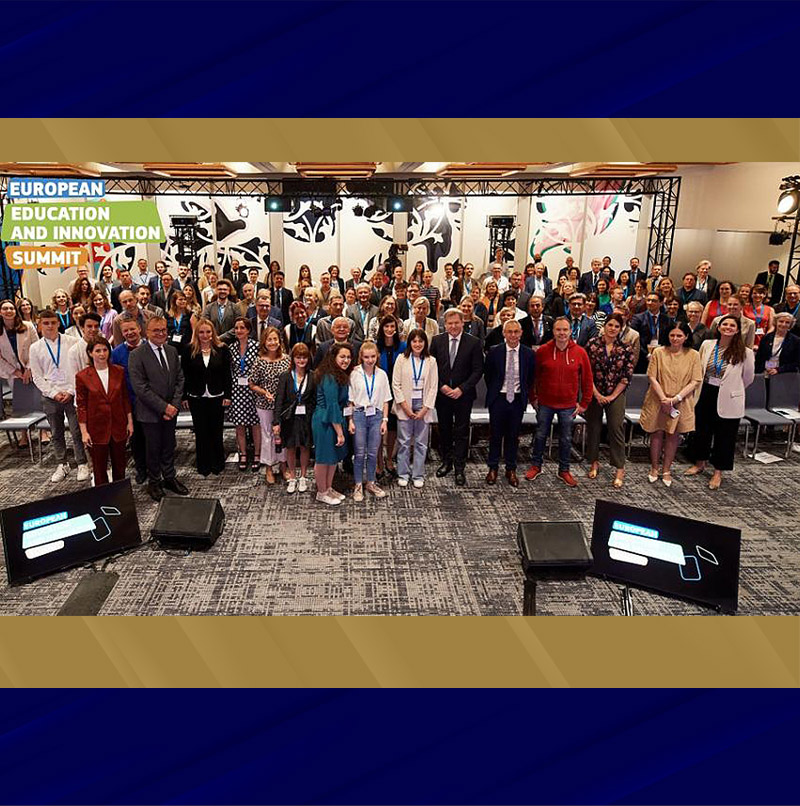European Education and Innovation Summit in Brussels
The EU Directorate-General "Innovation, Research, Culture, Education and Youth", under Commissioner Mariya Gabriel, organized in Brussels on 23 June 2022 the European Education and Innovation Summit. EURECA-PRO was represented by Dr. Evangelia Krassadaki, Coordinator of the Teaching & Learning Support Office of the Technical University of Crete.
- News
The EU Directorate-General “Innovation, Research, Culture, Education and Youth”, under Commissioner Mariya Gabriel, organized in Brussels on 23 June 2022 the European Education and Innovation Summit. EURECA-PRO was represented by Dr. Evangelia Krassadaki, Coordinator of the Teaching & Learning Support Office of the Technical University of Crete.
The Summit brought together the member-countries’ key actors of Education and Innovation, who shared knowledge and experiences on innovative educational practices and building bridges between education, in particular higher education, and innovation ecosystems.
The topics discussed revolved around these strategic axes: (a) the role of higher education institutions as drivers of innovation, (b) the importance of activation, creativity, stimulation of entrepreneurship through the students’ educational path, and (c) strengthening pupils/students’ entrepreneurial skills at all levels of education.
Key topics
The main discussion topics were:
- Strengthening students’ business skills, so that they can use innovation inside and outside the university, as well as the support of their professional inclusion in the field of innovation.
- Enhancing cooperation between universities and the innovation ecosystem, as well as the support of the academic career in innovation issues.
- Empowering the digital transformation of education through cross-sectoral/cross-disciplinary collaboration.
- Addressing the challenge of green innovation.
A key pillar of the summit was the role of education and innovation for the transformation of society and the future of Europe. Commissioner Mariya Gabriel emphasized the importance of education and training in innovation ecosystems, explained why they are a driver for innovation and how the integration of innovation in education is transformative for society.
At the round table, with the participation of the Commissioner, the Minister of Education of Slovenia, Rectors/Vice-Rectors, and the Mayor of the city of Cluj-Napoca (Romania), the role of education and innovation for the transformation of society and the future of Europe was highlighted, and important partnerships and collaborations of university institutions with local government and local communities were presented. Education plays a central role in developing, disseminating, and leveraging knowledge and innovation, building innovative pedagogies, and nurturing talent. Higher education institutions are given a prominent position at the crossroads of education, research, and innovation.
In the session ways of leveraging the learning path from primary to higher education were discussed, on providing pupils/students opportunities for inspiration to acquire an innovative and entrepreneurial mindset. The possibilities that exist in the first two levels of education, which coincide with the high creativity of young people, were highlighted to stimulate, and develop their innovation and entrepreneurship skills. In higher education, the need to support students to develop innovation and entrepreneurial knowledge, abilities and skills was emphasized, through innovative pedagogies, innovation-oriented academic routes, their participation in research, their mobility, as well as through opportunities to create bridges with the labor market and supporting their professional inclusion in the field of innovation. Europe expects today’s students to become tomorrow’s innovators. Among other things, the strengthening of cooperation between universities and the innovation ecosystem along with the support of academic careers in innovation issues were emphasized.
As a measure to implement the actions of the European strategy for universities, the “living labs” that bring together students of all disciplines, professors, researchers, businesses, associations, public authorities, and citizens to jointly create solutions for social challenges were mentioned. These workshops as open innovation ecosystems in real-life environments focus on co-creation, rapid prototyping, and testing, providing (different types of) shared value to stakeholders. These workshops are considered as a toolbox for the development of start-up business incubators in higher education institutions, which are supported by EU financial instruments. In this context, reference was made to the mechanisms for supporting students’ innovative ideas, from the initial idea to the creation of a new business, through the European Institute of Innovation and Technology (EIT), through its initiatives such as ‘Deep Tech’, the enhanced ‘Innovation Alliances for the Innovation Agenda’ and the ‘Higher Education Institutions Pilot Initiative’.
Accordingly, the speakers were positioned on individual topics, such as the value of interdisciplinary education for the development of students’ innovation skills, as well as the importance of learning stemming from education-research-students-society partnership, and with a view to modern challenges. The importance of STEM skills as well as skills for Artificial Intelligence combined with art and humanities/social sciences, and the need to adopt active teaching and learning techniques for the multifaceted development of students were highlighted. Also, the need to revise the curricula in the direction of integrating technological-research achievements and the principles of sustainability, guided by the need for social transformation based on the innovation of solutions, with Higher Education as a vehicle, was emphasized.
Strategic issues discussed at length included:
- The importance of linking education and research with the needs of local communities, real life and professional activity.
- The value of interdisciplinary education for the development of students’ new innovation skills.
- The importance of empowering learning stems from the partnership of education – research – students – society and in view of contemporary challenges.
- The importance of STEM skills includes abilities for Artificial Intelligence combined with art and humanities/social sciences.
- The need to adopt active teaching and learning techniques for the multifaceted development of students and assessment of their skills.
- The need to revise the study programs in the direction of the integration of technological – research achievements and the principles of sustainability.
- The need to collaboratively solve contemporary economic/social challenges through collaborations between university institutions, industry representatives and local/national authorities.
- The need for social transformation based on the innovation of solutions, with Higher Education as a vehicle.
- Author: Dr. Evangelia Krassadaki



